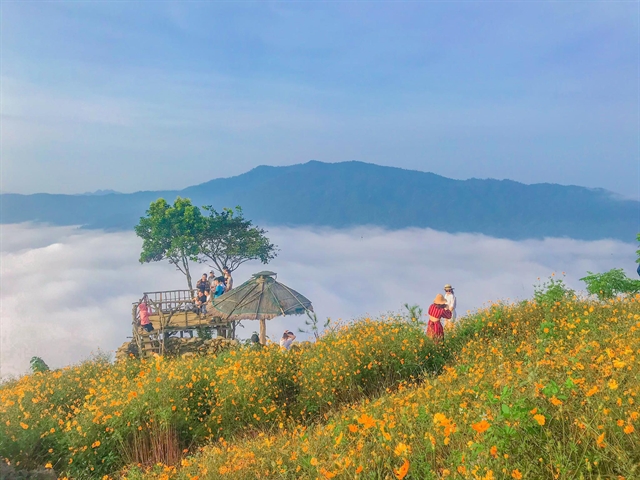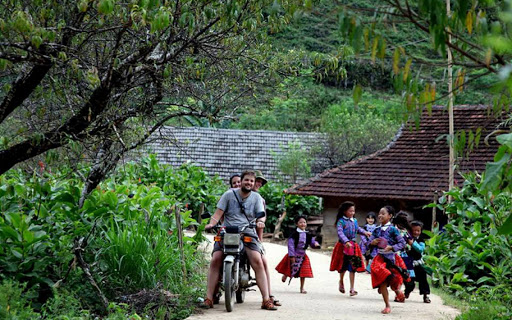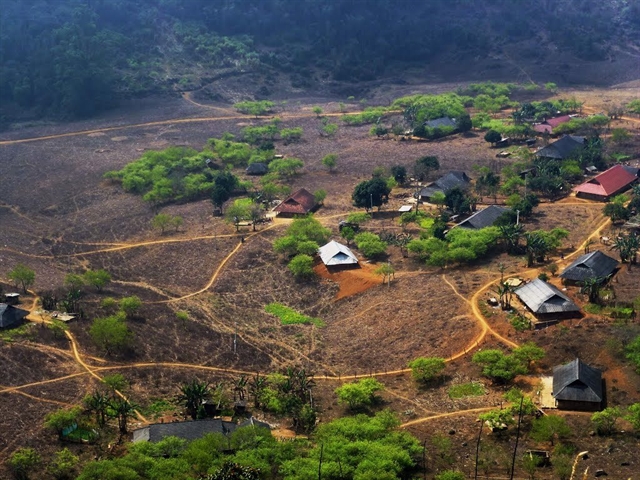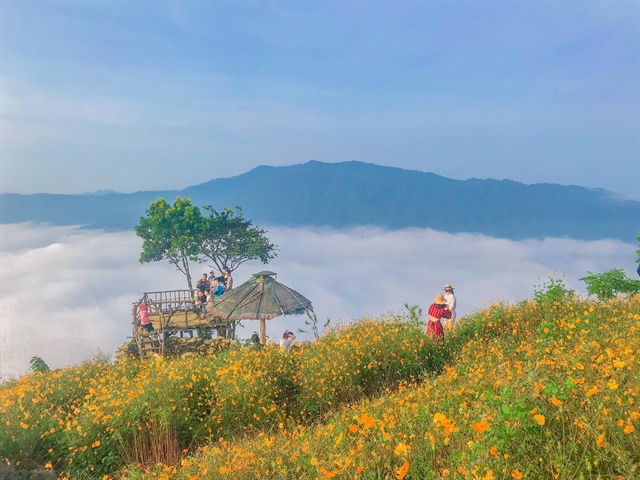[ad_1]

Lâm Giang
Located in the northwest with an altitude of 1,200m – 1,500m above sea level, Hang Kia and Pà Cò communes in Hòa Bình Province are covered by clouds almost year-round. This place is not only a great hideaway from the summer heat but also worth a visit in the autumn.
Leaving from the centre of Mai Châu District and after travelling about 30km over the mountain 1,200m high above sea level, we reached Pà Cò Commune and after about 10km more, Hang Kia.
Looking down from above we saw the green colour of the mountains and forests, hiding a glimpse of the roofs of the ethnic Mông people in the foggy space. We were interested in the landscape from the small, winding road with steep, narrow bends to the tea hills, stone fences, yellow canola flowers in front of each porch.
Going deeper into the villages, sometimes we found Mông women embroidering and their children playing.
The piles of firewood piled in the middle of the yard and the thin smoke rising from the top of the kitchens helped us leave our worries behind to enjoy a sense of peace.
Besides the road to explore the villages, we went to destinations with pristine beauty such as tea hills and plum gardens in Tà Xông A, Tà Xồ and Thung A Láng.
Along the road connecting the hamlets, the high points in the mountain are ideal places to see clouds.
There is Heaven Gate or on Sảm Thà mountain you can see Pù Luông peak of neighbouring Thanh Hóa Province and Pha Luông peak of Sơn La Province.
Hang Kia – Pà Cò has many small valleys interwoven between the Hang Kia – Pà Cò nature reserve. The terrain is mainly steep hills and mountains with ‘cat-ears’ rocks.
Pà Cò Commune’s population accounts for 99 per cent of the Mông who maintain many traditional crafts such as weaving, indigo dyeing, wax painting, and iron forging.

According to the Hòa Bình provincial Department of Culture, Sports and Tourism, brocade products of Pà Cò have been shipped to many domestic and international markets.
Hang Kia – Pà Cò used to be a busy place for the drug trade but now life here has returned to peace, with infrastructure like schools, medical stations and a telecommunication network, improving people’s lives. Many households have started to develop a form of homestay tourism.

In Hang Kia, we stayed at Y Múa homestay at the entrance to the village and enjoyed mountainous life.
Waking up early in the morning in the chilly weather, we felt the fresh air of the dawn and watched clouds floating at our feet. Without the hustle and bustle of the city, we wallowed in the wild natural landscape and the hospitality of the village.
Climbing to the Heaven Gate, a unique ‘cloud hunting’ spot located 1,100m above the sea, we saw the sea of white clouds floating.
In Hang Kia – Pà Cò, we experienced mountain climbing, picking wild tea and forest vegetables, farming with villagers, gathering on the porch to embroider dresses, learning to draw wax and brocade weaving.
In the evening, we enjoyed the cuisine of the Mông, like maize wine, thắng cố (horse meat and offal stew), bánh dày (round rice cake), mèn mén (steamed minced maize), chicken, pig and bamboo shoots mixed with mắc khén, an indispensable spice in the mountainous cuisines.
After that, we relaxed and soaked our feet with medicinal herbs in the cool weather, and drank a glass of maize wine and watched the starry night sky.
Y Múa homestay is one of two homestays in Hang Kia, open 2012. The owner Y Múa said when there are many tourists, the homestay needs 15 people to work.
“For many years, the local government has always wondered how to increase the income of the local people in Hang Kia and Pà Cò. Up to now, the development of eco-tourism and community tourism has been identified as a direction for the people of the two communes to develop their economy while preserving and promoting their unique cultural values,” said Ðặng Mai Sơn, chairman of Mai Châu District’s People’s Committee.
“Currently, tourists and domestic and international travel agencies have started to know Hang Kia – Pà Cò, but in the two communes, there are only several households doing community tourism combining providing service travel. These activities are also fragmented,” said Sơn.
According to Sơn, recently, Mai Châu District has held many meetings with locals to encourage them to register for the development of homestay service, while the rest of the households are encouraged to farm clean produce to serve tourism.
Households running homestays are trained to improve their business management and tourism skills, and are supported by the tourism authority with facilities such as blankets, curtains, beds and wardrobes to serve tourists. — VNS
[ad_2]
Source link
